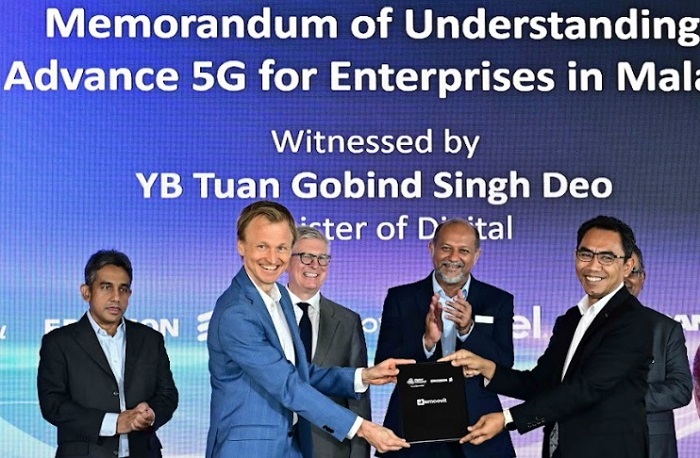DNB-Ericsson in latest effort to boost tepid enterprise 5G adoption in Malaysia
By Dashveenjit Kaur May 4, 2024
- MoUs with Intel, Ericsson, eMooVit, Scania and SKF Malaysia to build use cases
- Gobind hopeful enterprises will embrace possibilities from leveraging 5G solutions

Despite the tepid enterprise interest and ever lower adoption of 5G based services, Digital Nasional Bhd (DNB), the operator of Malaysia’s national 5G network and its sole network equipment provider, Ericsson, are pushing ahead to create market interest in adopting 5G based services.
Their latest effort comes in the form of MoUs signed with Intel, eMooVit Technology, a Malaysian autonomous vehicle startup, and two global Swedish companies, Scania, a transportation solutions provider and SKF Malaysia, a bearing and seal manufacturer. Börje Ekholm, CEO of Ericsson Group who was making an Asian tour, was in KL to witness the signing with Malaysia’s Digital Minister Gobind Singh in attendance. DNB is a company established by the Ministry of Finance and sits under the purview of Gobind’s ministry.
DNB and Ericsson are hoping the MoUs will pave the way towards developing advanced, industry-tailored 5G solutions tol empower enterprises to unlock new operational efficiencies, drive product innovations, and explore new business models.
"Malaysia is uniquely positioned to accelerate digitalization. These MOUs will secure industry lighthouses to demonstrate the full potential of digitalization and 5G, catalyzing adoption across sectors," said Ahmad Zaki Zahid, DNB's Chief Strategy Officer, on the hoped-for outcome of the MOUs.
Dr Hairi Zamzuri, eMooVit's CEO, said, "Partnering with Ericsson is vital for turning ideas into reality through business use, with the ultimate aim of transforming urban transportation in the future."
The startup is piloting autonomous transport use cases by integrating its operational technology sensors, camera systems, and video analytics over the 5G network.
Gobind emphasized the pivotal role of Malaysia's 5G ecosystem in propelling enterprises towards digital transformation.
"Malaysia's world-class 5G network is the cornerstone of this digitalization plan. The widespread availability (80.2% coverage of populated areas) of high-quality 5G in Malaysia means that it is far easier than ever for industries to adopt use cases powered by 5G technology."
Gobind noted that Malaysia's 5G deployment is acknowledged to be one of the fastest globally, reaching 80% of population coverage within just over two years of launch. As of March 2024, DNB said the network serves over 11.9 million 5G subscribers. Ekholm attributed this to the “excellent execution by DNB” resulting in, “now Malaysia has a world-class digital infrastructure.”
However, despite accolades such as having a world class 5G network, being the fastest to hit 80%, being among the most cost competitive, have not led to enterprises in Malaysia adopting 5G into their digital transformation or competitive strategies which is why Gobind said, "I am hopeful that with this digitalization initiative by DNB and Ericsson, more enterprises will embrace the possibilities that these advanced telecommunication technologies can bring to their businesses."
Taking questions from the media on developments around the second 5G network for Malaysia, Gobind said the new board of DNB, on Tuesday, will study a due diligence report regarding the 5G share sale agreement (SSA), before making any recommendations. He reiterated that the government’s position was that the second 5G network would only be introduced after certain pre-conditions of the SSA between mobile network operators and DNB have been met.
“The latest pre-condition met was the appointment of the directors last week," he said.
Intel, Scania and SKF Malaysia roles
Intel will be the technology partner to collaborate on developing 5G use cases to spur enterprises' adoption. Intel and Ericsson aim to showcase how communication service providers can speed up 5G adoption and expand B2B engagements with compelling use cases. Intel will focus on use cases in key sectors like manufacturing, transport, and logistics.
AK Chong, Intel's VP of Foundry Manufacturing & Supply Chain and Malaysia MD said, "Intel's technology is at the heart of this industry transformation, catalyzing AI at the edge and breaking down barriers in the 5G core space," she said.
Scania will focus on integrating sensors, fleet management systems, and analytics to leverage 5 G's enhanced mobile broadband capabilities for optimized logistics operations. "With 5G technology, Scania Malaysia aims to optimize our assembly and fleet management further to deliver greater efficiency to customers," said Heba Eltarifi, Managing Director of Scania Southeast Asia.
The collaboration with SKF Malaysia, a world leader in bearing and seal solutions, will explore using 5G to enable wireless digitalization on manufacturing floors. Potential use cases include data shower analysis, video sensor monitoring, and data capture. "We expect this collaboration to represent a significant milestone in our digital transformation journey," said Vignesh Sakthinathan, Managing Director of SKF Malaysia.
According to David Hägerbro, Head of Ericsson Malaysia, Sri Lanka, and Bangladesh, Malaysia's 5G network ranks globally among the top five thanks to its availability, affordability, customer experience, and capability. "The digital infrastructure enabled by 5G makes doing business in Malaysia more competitive and attractive for foreign investors.”
Related Stories :


